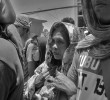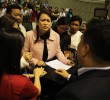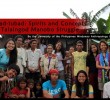Rigodon
By Luis V. Teodoro
Convicted of plunder in 2004, Joseph Estrada was pardoned in 2007, after a public declaration that he would no longer run for any elective office.
But that was then. Since early this year Estrada has been saying that he might seek in 2010 the presidency he lost to Gloria Macapagal-Arroyo in 2001, when the second People Power uprising known as EDSA 2 removed him from office. He’s refused to say if he will indeed run next year, but Estrada recently bought not only two helicopters, but also, says his friend and political ally Juan Ponce Enrile, a private jet and 20 vans. He’s preparing for the 2010 campaign, says Enrile: Estrada will run next year.
The Constitution does say that no president can seek reelection. But Estrada and his lawyers have been saying that the ban doesn’t apply to him because he didn’t serve his full term. Gloria Macapagal-Arroyo’s ever loyal troops in the House of Representatives — the same herd that says she can run for Congress in 2010 — say, however, that he can’t, because his conviction for plunder carried with it permanent disqualification from running for any elective office. And yet the presidential order pardoning Estrada did restore his civil and political rights, which makes his case at least debatable.
Estrada made the rounds of the poor districts of the capital as well as rural communities almost immediately after his release in 2007. He’s also popped up in the aftermath of natural disasters, distributing the usual tins of sardines and instant noodles to hungry folk, and has generally made himself visible in the media.
The media have obliged because Estrada’s good for a sound byte or a laugh or two. But how seriously his threat to run is regarded may be gauged from his being invited to the ANC leadership forum at the University of the Philippines, where he regaled TV viewers and the on-site audience of mostly UP students and faculty with the usual one-liners.
When asked why he’s thinking of running, Estrada’s mantra has been “to unify the opposition”. He has said that the Arroyo coalition should be prevented from keeping power at all costs, and that, should the opposition fail to field one candidate, he would run, implying thereby that he could rally the opposition around his candidacy.
Estrada is apparently encouraged by the crowds he’s still able to draw in his sorties. The latest Social Weather Stations survey on voter preferences isn’t likely to dissuade him from thoughts of returning to Malacanang either. That survey found him fourth in voter preference in a field of nine possible presidential candidates (Manuel Villar, Noli de Castro, Francis Escudero, Estrada, Loren legarda, Manuel Roxas II, Panfilo Lacson [before he withdrew], Jejomar Binay, and Bayani Fernando).
The key word is “returning”. If Estrada does run, assuming no legal impediments to that demented possibility, it will be on the strength of the assumption that the poor he claims for his constituency will restore him to Malacanang despite his plunder conviction, his vast failures at governance during his Palace tenure, his multiple mistresses and households, and so forth and so on to infinity.
But Estrada’s gall in believing that he can run — and his possible win in 2010, all things being possible in this country of endless wonders — would also throw a bright light on his successor’s own distinct failures.
Those failures may not involve mistresses and midnight drinking sessions with shady cronies. But they’ve been even more disastrous to the country of our lost hopes. The continuing decline of the economy to arrest which exporting Philippine labor has become a lead policy; the corruption that’s metastasized throughout the entire government structure; the destruction of practically every government institution through bribery, intimidation and deceit; the pandering to foreign interests and the misuse of economic and military aid; the human rights violations and extra judicial killings; the harassment and intimidation of the press; the sheer stupidity of the statements that emanate from some of the most mindless government mouthpieces to ever rise from the cesspool of Philippine politics — all this have made the Estrada regime look good by comparison.
Of course the lesser evil argument shouldn’t be the basis for returning to power anyone who’s been there before and failed. But the electorate does it all the time. If Estrada’s dreams of recovering Malacanang can mean anything, it is to remind Filipinos how every election has meant nothing more than a change of places among the very same people who’ve been running this country into the ground for decades, in a seemingly endless rigodon that’s all form and no substance.
The rigodon, a dance from the Spanish colonial period aptly revived in Malacanang last year by Mrs. Arroyo during the Independence Day ball, and dancing which the Philippine elite likes to think endows it with nobility and class, is the apt Philippine symbol not only for the pretend changes in the Cabinet and Congress in which people are shuffled around from one post to another, but also for the same illusion of change every election offers, but never delivers on.
The members of the same class of betrayers, traitors, clowns and idiots alternate in office in this country courtesy of those elections, which, whether clean, dirty, honest or fraud- ridden, nevertheless end with the same dire results. Like the rigodon, Philippine elections are a spectator sport, in which what’s going on seems so elegant, so refined and so meaningful but is in truth as empty as the brain pans of certain Malacanang talking heads. Those aghast at the prospect of an Estrada return, or at his impudence, should think about whether it’s going to be any worse than what’s been going on in this country ever since it began electing the same people to the same offices over and over again. (June 26, 2009 BusinessWorld Posted by Davao Today)

![[STANDPOINT] Illegal drugs and the NIMBY mindset](https://davaotoday.com/wp-content/uploads/2016/09/Mags-Maglana_UPMIN-Sept.-20-110x100.jpg)








